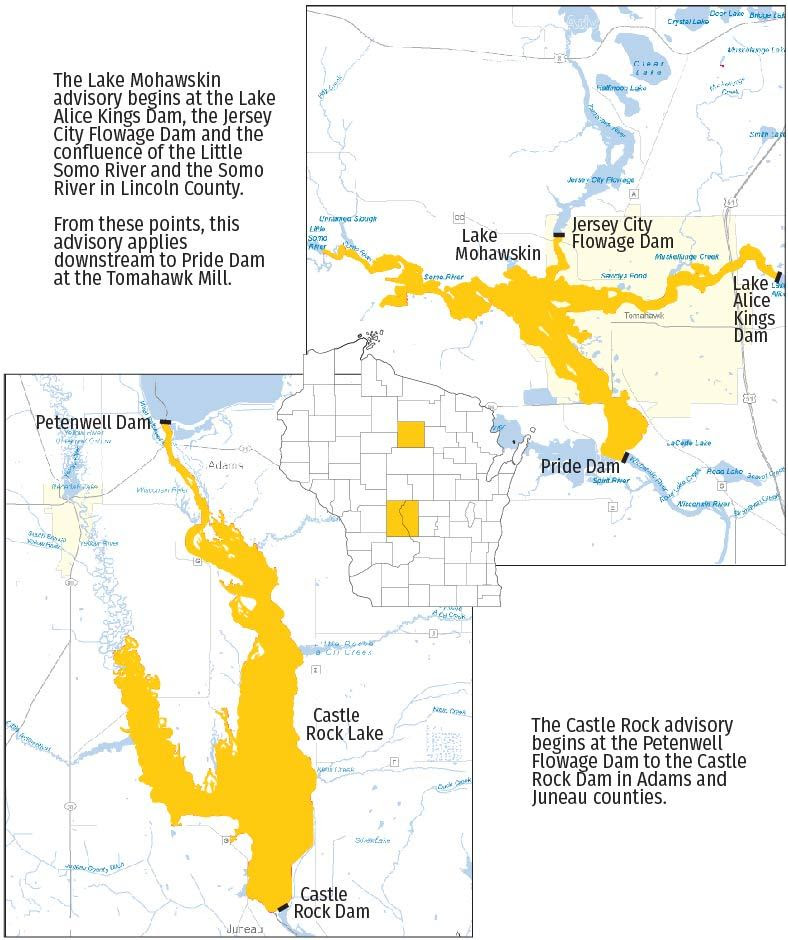MADISON, Wis. – The Wisconsin Department of Natural Resources (DNR) and the Department of Health Services (DHS) today announced new consumption advisories for several fish species in Castle Rock Lake and Lake Mohawksin, both of which are segments of the Wisconsin River, following results of fish sampling.
Elevated levels of PFOS (perfluorooctane sulfonate), a type of PFAS (per- and polyfluoroalkyl substances), were detected in several fish species sampled from both Castle Rock Lake and Lake Mohawksin in March and April 2021, respectively. As a result, the DNR and DHS recommend the following consumption guidelines for anyone harvesting fish from those waterbodies:
CASTLE ROCK LAKE (Adams/Juneau Counties): Advisory is from the Petenwell Flowage Dam to the Castle Rock Lake Dam.
| SPECIES | PREVIOUS ADVISORY | NEW ADVISORY |
| BLUEGILL | General/Statewide* | 1 meal/week |
| YELLOW PERCH | General/Statewide* | 1 meal/week |
| BLACK CRAPPIE | General/Statewide* | 1 meal/week |
| COMMON CARP | 1 meal/month (PCBs) | 1 meal/month (PCBs) (No change) |
LAKE MOHAWKSIN (Lincoln County): Advisory begins at the Lake Alice Kings Dam, the Jersey City Flowage Dam and the confluence of the Little Somo River and the Somo River. From those points, this advisory applies downstream to Pride Dam at the Tomahawk Mill.
| SPECIES | PREVIOUS ADVISORY | NEW ADVISORY |
| BLUEGILL | General/Statewide* | 1 meal/week |
| PUMPKINSEED | General/Statewide* | 1 meal/month |
| YELLOW PERCH | General/Statewide* | 1 meal/week |
| BLACK CRAPPIE | General/Statewide* | 1 meal/month |
| ROCK BASS | General/Statewide* | 1 meal/month |
*The general/statewide consumption advice for women <50 and children is 1 meal/week for panfish and 1 meal/month for all other species. For women >50 and men, the general/statewide consumption advice is 1 meal/week for all species except for panfish, which are unrestricted.
PFAS are a group of human-made chemicals that have been used for decades in various products, such as non-stick cookware, fast food wrappers, stain-resistant sprays and certain types of firefighting foams that have made their way into the environment.
Health risks may increase when fish with high levels of PFAS are consumed. These can include increased cholesterol levels, decreased immune response, and decreased fertility in women, among other health effects. More information is available on the DHS website.
Following fish consumption advisories will help protect you from consuming excess PFOS, Polychlorinated Biphenyls (PCBs) and mercury.
There are consumption advisories already in place for various stretches of the Wisconsin River. A complete list of up-to-date consumption advisories can be found in the DNR’s Choose Wisely booklet.
Additional fish consumption advice and information on the effects of PFAS can be found on the DNR’s website.
 |


